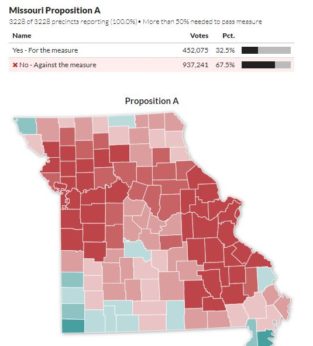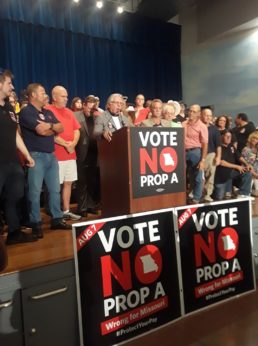
St. LOUIS – Election Day, August 7, 4:30 a.m. Aside from the few city buses making their early morning stops, the streets were quiet. Daylight was still an hour away. Rainfall was expected most of the day. Across the city of St. Louis—and the entire state of Missouri—union and non-union households were stirring. Outside my third-floor window I saw bedroom lights flickering on and could almost smell the coffee brewing.
To the left, the right, and straight ahead, as far as the eye could see, were “Vote No on Prop A” signs scattered across front yards.
This was no ordinary primary election day. Tuesday would mark the end of a yearlong, hard-fought effort by labor, students, community allies, and activists from all walks of life—all part of the working class—to keep Missouri a proud union state.
Volunteers collected over 310,000 signatures to place Missouri’s right-to-work legislation on the ballot for voters to decide, knocked on over 800,000 doors, made over a million phone calls, and placed over 100,000 yard signs—keeping the conversations going with family, friends, and neighbors in between.
Voting down Prop A (right-to-work) would be a crushing defeat for Republican state legislators, and disgraced ex-governor Eric Greitens, who peddled the BS narrative that” right-to-work” would bring jobs to the state, and forced the law down voters’ throats last year.
Beyond state borders, it would be a powerful rebuke of the Trump Administration’s anti-worker policies, pro-“right-to-work” politicians, and the National Right to Work Committee funded by corporate interest lobbyists.
Volunteers and organizers worked 12-18 hour shifts at polling locations state-wide, handing out literature, giving rides to and from polling locations, and going for one last round of door knocking to get out the vote—Liz Shuler, AFL-CIO Secretary-Treasurer, led the afternoon canvas in Kansas City, Mo., while CWA President Chris Shelton and Secretary-Treasurer Sara Steffens led afternoon’s last phone bank in St. Louis.
“Are you voting no on Prop A?”
“Yes, I’ll definitely be voting no…we can’t lose good union jobs or good wages and benefits—my husband (brother, sister, mother, father, grandmother, grandfather, etc..) were union and I’m proud of that fact.”
I would ask that question to every voter walking—running to avoid getting soaked during the afternoon—into their polling place, and 98 percent gave the same answer.
This election touched voters personally, many of them growing up hearing stories of the first time Missouri made labor history in ‘78.
Constitutional Amendment 23 (Right-to-Work) was introduced by the Freedom to Work Committee November 7, 1978 and would have added language to the Missouri Constitution—like Prop A’s language—making the state a “right-to-work” state.
CONSTITUTIONAL AMENDMENT NO. 23
Provides that no person be deprived of the right to work for any employer because of membership or nonmembership in any labor organization or because of payment or nonpayment of charges to any labor organization. It is estimated that there would be no additional cost or savings to the state if this amendment is adopted.
The National Right-to-Work Committee and its local branch in Missouri had been testing the political waters for years to push anti-worker legislation, creating a domino effect in other industrialized, union-strong states throughout the Midwest.
The amendment failed back then by a 60 to 40 margin with 948,387 opposed and 631,829 in favor.
Back to 2018: 7:00 p.m. Closing time at the polls.
As volunteers plucked and tossed out all the yard signs outside of polling locations, union members and their families headed over to the Sheet Metal Workers Local 36 union hall for the election results watch party.

Rank and file members, politicians, and local labor leaders paced up and down throughout the massive hall, union-made beers in hand. While there was an overwhelming sense of confidence in the air, exhaustion coupled with anxiety could be seen on people’s faces.
Classic rock songs of the ‘70s could be heard overhead—a fitting omen as history would repeat itself—and as time passed, all eyes began looking straight ahead to the stage and podium.
The overwhelming victory was announced at 10:17 pm: Prop A lost 67 percent to 33 percent (937,241 No—452,075 Yes). This made Missouri the first state to defeat “right-to-work” at the ballot box…twice!
“This is a tremendous victory,” said Mike Louis, president of the Missouri AFL-CIO. “This is what we’ve worked so hard for. This is a victory for the people of the middle class. It’s time to stop counting people who work as being middle class when the CEO makes 361 times more than we do.”
“Forty years ago, they tried to force this down our throats, and we said, ‘No,’” continued Louis. “Today we’re saying, ‘Not then, not now, not ever! … Today we sent a clear message to any politician, any CEO any dark money donor who wants to silence our voices, the voices of the people, the voices of who should be middle-class America, we’ll stand together and we’re going to tell them ‘Hell no!'”
Tuesday’s Prop A vote was defeated in both urban and rural areas, and despite a decline in union membership nationwide. Unofficial results showed that only 14 of Missouri’s 114 counites supported the right-to-work measure.
And like ’78, these results show that partisan politics and workplace issues don’t have to line up.
Many of the rural counties who voted no, also voted Trump/Pence in 2016—an example of populist politics making its comeback.
And don’t overthink it. No matter how hard we try that logic will never make sense. But, it gives us a roadmap on how to better talk “shop” and politics.
“I’ve seen the facts of states that have laws like right to work,” said United Auto Workers union member Michelle Whitley of Wright City. “It’s just not a good thing for our state.”
“I don’t think we’ll ever stop fighting,”
Now, the fight moves on to November.












Comments